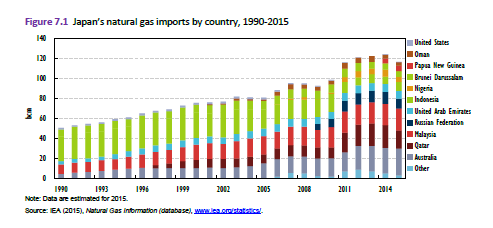IEA Urges Japan to Curb Fossil Fuels
Japan should diversify and decarbonise its energy mix through a combination of renewable and nuclear energy and efficient thermal power generation, the International Energy Agency (IEA) said September 21.
Launching the IEA's country report in Tokyo, IEA deputy executive director Paul Simons said that, since the March 2011 Fukushima accident, Japan’s energy system had shown great resilience but added: “Japan should take concrete steps to meet its 2030 climate target and to cut emissions significantly more by 2050.” Nuclear power should be gradually restored once public trust is regained.
The shutdown of all Japan’s nuclear plants after the 2011 earthquake and tsunami led to a significant rise in fossil fuels use: gas imports, all as LNG, increased from just below 100bn m3 in 2010 to above 120bn m3/yr in 2012-14, before easing to an estimated 117bn m3 last year.

Japan's natural gas imports by country (Graphic credit: IEA)
The IEA also urged Japan to fully implement its intended electricity and gas market reforms. Power and gas prices increased sharply in the immediate aftermath of the 2011 disaster, as did fossil fuels' share of power generation. In 2015, it estimates that Japan's 2015 electricity mix was met by gas 39.2%, coal 34%, oil 9%, hydro 8.4%, with other renewables 8.5% and nuclear just 0.9%.
Japan’s gas market reform consists of introducing full retail competition in 2017, improving access to pipelines and improving third-party access conditions and tariffs related to LNG terminals. The IEA said it “welcomes this necessary reform” as well as recent government proposals for a new strategy to develop a more flexible international LNG market, including a possible LNG trading hub in Japan.
The IEA also noted that Japan's gas pipeline network remains "fragmented" and recommended the government to pursue its current review "including the legal or ownership unbundling of the large integrated gas utilities which have large pipeline networks and hold dominant positions in the gas market."
The report said that Japan produced 2.9bn m3 of indigenous gas last year, and that no test production from deepwater methane hydrates (methane ice crystals) had occurred since 2013, but that the government by 2018 plans to carry out test drilling in waters with suitable potential.
Mark Smedley


